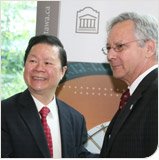
On March 29-30, 2012 University of Ottawa Senate Member and physics graduate student Joseph Hickey posted these reports on his Student's-Eye-View blog:
Hickey made a motion before the Ontario Superior Court of Justice on March 28, 2012 to intervene in a motion for leave to appeal a judge's decision to not hear a motion to allow public and media access at the cross-examinations of public officials U of O president Allan Rock, U of O chair of the Board of Governors Robert Giroux, and others.
Hickey argued that he has a Charter right to attend the cross-examinations in order to blog-report about the sessions which are held under Court supervision at a private court reporter's offices.
Hickey had attended two previous such cross-examinations in the same St. Lewis v. Rancourt action and had blogged his observations and opinions. Hickey and other members of the public had then been barred by court order to not attend two specific re-examinations in the same action.
This had been followed by an "open court motion" served by the defendant (Rancourt) which was barred from being heard on its merits, leading to Rancourt's motion for leave to appeal, at which Hickey sought to intervene.
It seemed clear to this observer, that Hickey had standing to intervene as both a member of the public and as a member of the media seeking access to a court process, but the judge sided with the plaintiff (St. Lewis) and the U of O.
The U of O had not moved to intervene in the motion for leave to appeal or in Hickey's motion to intervene but was given "automatic" leave to intervene in both motions in the "private" action and used this intervener status to argue (in the person of lawyer Peter Doody) against Hickey and then to claim costs against Hickey for having forced it to argue against Hickey.
St. Lewis (via her lawyer Richard Dearden), whose legal costs are entirely paid by the University of Ottawa, also seeks costs against Hickey, at a punitive level, for having forced her to argue against Hickey's request to have his say.
Justice Robert Smith ruled that Hickey did not satisfy the test to have his say on the matter of his (and public and media) access to court processes pursuant to the Charter. Justice Smith reasoned that Hickey's contribution to the "private" libel action would not serve justice.
“I do not find that Mr. Hickey has an interest or perspective different from the Defendant’s. The nature of the case is also a factor to be considered, and in this case it is a libel action between two individuals. I do not find that Mr. Hickey would make any useful contribution to the resolution of the dispute between Mr. Rancourt and Ms. St. Lewis, or make a useful contribution towards resolving the question of whether or not Leave to Appeal should be granted of Justice Beaudoin’s order or Master MacLeod’s order.”
“I also find that Mr. Hickey would not be adversely affected by the judgement in favour of either Ms. St. Lewis or the Defendant, Mr. Rancourt since this is a private dispute between two individuals.”
– Smith J, March 28, 2012
Justice Smith also explained to Hickey, regarding costs, that an individual who attempts to intervene in a lawsuit must expect a certain financial risk which counters the costs imposed on the opposing parties.
St. Lewis and the university seek to hit the student with one third of his annual salary for asking to have his say about public access to a court process, as a citizen directly affected.
The university has a duty, enshrined in jurisprudence, to defend academic freedom.
As background, all related posts about the lawsuit are HERE.
Links to all pleadings and court documents in the lawsuit are HERE.
Links to all pleadings and court documents in the lawsuit are HERE.




No comments:
Post a Comment